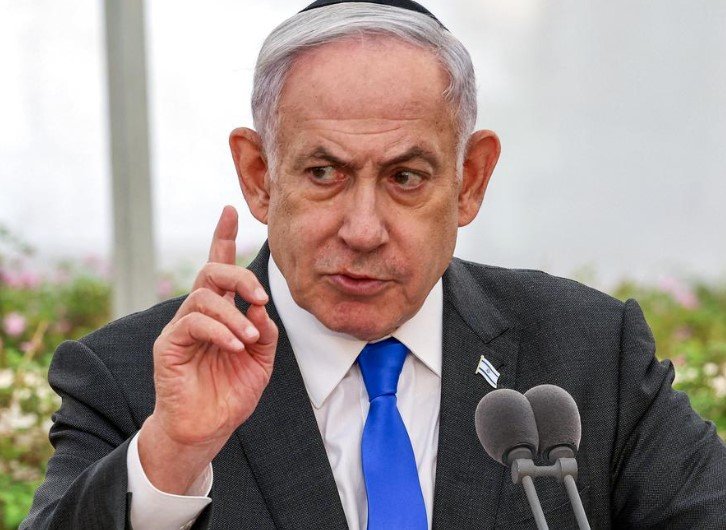Morocco has stepped up with over 30 Arab and Muslim nations to slam Israeli Prime Minister Benjamin Netanyahu’s support for the “Greater Israel” idea. This move highlights growing tensions in the Middle East as leaders call out what they see as a threat to regional peace.
Netanyahu’s Bold Remarks Spark Outrage
Netanyahu made headlines on August 12 during an interview with I24News. He openly backed the vision of a Greater Israel, smiling as he said he felt a strong connection to it.
This statement quickly spread across Israeli media, confirming fears about expansionist goals. Many view it as a direct challenge to international borders and peace efforts.
The idea of Greater Israel draws from biblical texts, suggesting land from the Nile River to the Euphrates. It includes parts of Egypt, Jordan, Syria, Lebanon, Iraq, and Saudi Arabia.
Critics argue this vision ignores modern borders and fuels conflict. Netanyahu’s words came at a time when Israel faces scrutiny over settlements in the West Bank.
Arab leaders see this as proof of colonial thinking. They worry it could lead to more instability in an already tense region.
Morocco Joins the Chorus of Condemnation
Morocco signed a joint statement with more than 30 countries, calling Netanyahu’s comments illegal and dangerous. The statement labels them a violation of international law and a risk to Arab security.
This group includes heavyweights like Saudi Arabia, Egypt, Jordan, and Qatar. They united under the Arab League, Organization of Islamic Cooperation, and Gulf Cooperation Council.
The document rejects any annexation or settler violence. It also criticizes recent approvals for new settlements in the West Bank.

Morocco’s involvement stands out given its past ties with Israel. Yet, the kingdom prioritized solidarity with Arab nations on this issue.
Officials in Rabat emphasized the need for stable relations based on law. They urged global powers to address these threats promptly.
- Key points from the joint statement:
- Denounces Greater Israel as a threat to sovereignty.
- Calls for end to settlement expansions.
- Reaffirms support for Palestinian statehood.
- Warns of risks to regional peace.
Reactions Across the Arab World
Saudi Arabia led with a strong rejection, calling the ideas colonial and outdated. They stressed Palestinian rights and the need for an independent state.
Egypt demanded explanations, linking the remarks to past occupations like Sinai in 1967. They warned of provoked instability.
Jordan’s foreign ministry described it as a dangerous escalation. Iraq called it a provocation against sovereign nations.
Qatar and others echoed these views, focusing on peace rejection. The Arab League labeled it a mentality of colonial delusions.
These responses show a unified front against perceived threats. Leaders fear it could undo years of diplomatic progress.
In recent months, similar tensions rose with Israel’s actions in Gaza and the West Bank. This adds to a pattern of confrontations.
Historical Roots of Greater Israel Concept
The Greater Israel notion stems from religious texts outlining vast lands promised to ancient Israelites. Extremist groups in Israel push this as a modern goal.
Over decades, it influenced policies like settlement building. Critics say it aims to block Palestinian state creation.
In 2025, approvals for new colonies in areas like E1 zone raised alarms. These moves separate key Palestinian territories.
Related events include ongoing conflicts with Iran and militia groups. Netanyahu’s government faces internal and external pressures.
Arab grassroots movements blame normalization deals for empowering Israel. They call for stronger resistance against expansion.
| Country | Key Reaction | Date |
|---|---|---|
| Saudi Arabia | Total rejection of colonial ideas; supports Palestinian state | August 14, 2025 |
| Egypt | Demands clarifications; warns of instability | August 13, 2025 |
| Jordan | Calls it dangerous escalation and threat to sovereignty | August 14, 2025 |
| Morocco | Joins joint statement condemning violation of law | August 17, 2025 |
| Qatar | Condemns as rejection of peace | August 15, 2025 |
Broader Implications for Peace
Netanyahu’s stance could hinder talks with Palestinians. It raises questions about Israel’s commitment to two-state solutions.
Regional stability hangs in the balance amid rising conflicts. Experts predict more diplomatic fallout if expansions continue.
International bodies like the UN have urged restraint. Yet, enforcement remains a challenge in the face of bold claims.
This event ties into 2025’s escalations, including missile strikes and hostage issues. It underscores the need for dialogue over division.
As tensions build, Arab nations push for global intervention. They aim to protect borders and promote lasting peace.
What do you think about these developments? Share your views in the comments and spread the word to keep the conversation going.
